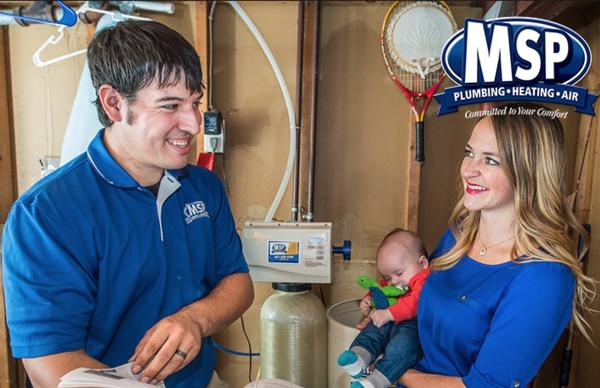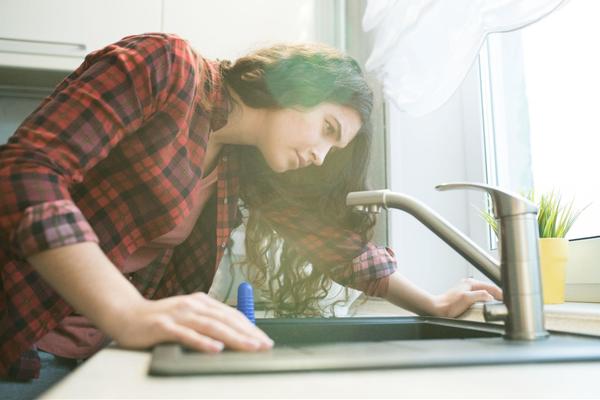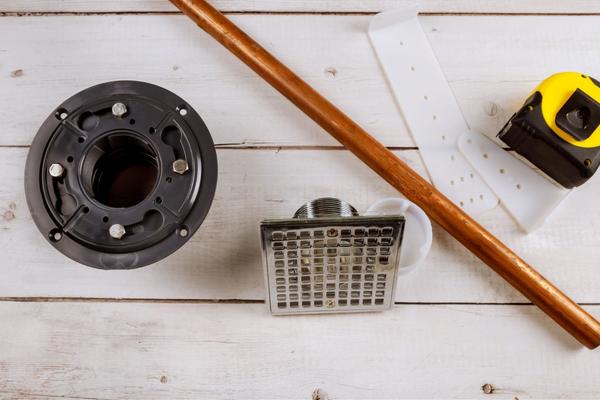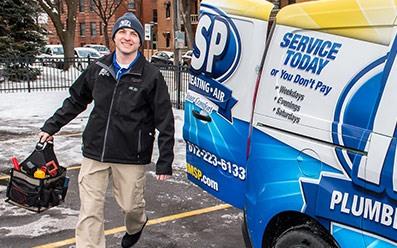How To Prepare Your Drains & Pipes for the Holidays

Prepare your drains and pipes for a stress-free holiday season.
MSP has proudly served the Twin Cities area for over a century. This means we’ve worked through our share of winter holidays and have seen firsthand the plumbing problems that can arise whether you’re on vacation or hosting holiday parties. Cooking for guests and having more people use your toilets, showers, and sinks increase the likelihood of plumbing problems during this festive time of year. Homeowners have also called us to repair pipes that have frozen and burst while they were away.
You don’t want to be stuck dealing with a sudden plumbing problem while you have guests over or when you’re away from home. Luckily, these problems are preventable. We have tips for a more enjoyable holiday season without any plumbing surprises.
Here’s how you can prepare your drain and pipes for:
Want Trusted Plumbers to Inspect Your Drains and Pipes? Contact MSP Plumbing Heating Air!
MSP Plumbing Heating Air has been in the plumbing business for over 100 years. We're here for you whether you’re concerned about a burst or frozen pipe, clogged drain, or damaged garbage disposal. If you want to prevent water damage, we're also ready to help. Twin Cities homeowners back up our reliable plumbing work with over a thousand 5-star reviews.
Call us today at (651) 228-9200 to prevent plumbing inconveniences during the holiday season.
Prepare Your Drains & Pipes For When You’re Away On Vacation
Returning home to no hot water is a major inconvenience. Plus, pipes that end up bursting while you’re away can lead to potential water damage to your home.
We’ve compiled some tips to prevent your pipes from freezing this winter and what to do if you come back to frozen pipes.
Preventing Frozen Pipes Before Leaving

Leave your faucets dripping before leaving on vacation.
Our prevention advice revolves around keeping your pipes warm and the water flowing inside them. When the temperature dips, pressure builds inside your pipes due to the expanding ice, and then they burst.
Make sure to:
- Drain water from any outdoor faucets: Shut off the water to your outside hose faucets, then open the valves to ensure all the water empties out. Afterward, drain and safely store your water hoses.
- Winterize your pipes: A plumber can help you properly winterize your outdoor faucets and insulate any pipes near outer walls, crawlspaces, or inside attics. These areas are the most susceptible to freezing. The insulation slows down heat transfer.
- Let your indoor faucets drip a bit: You can run them at a steady trickle while you’re gone or have a housesitter come by and turn on the faucets daily. While homeowners believe this is a waste of water and money, fixing a burst or frozen pipe is significantly more expensive. You don’t need to run them at full blast. Flowing water at any flow rate takes longer to freeze than standing water in a pipe.
- Drain and shut off your main water valve: If you’d rather not leave water trickling while you’re gone, shutting off your main water valve can provide you with peace of mind. Locate the main water supply valve in your home, which is usually outside your home near the water meter or in a basement. Once you shut it off, turn on all your home’s taps (including sinks, showers, and tubs) and flush all toilets until the tanks are empty. Leave the taps open before you leave.
- Keep your thermostat at 55°F or higher while gone: This is the minimum you should set when you’re not at home during the winter. Most plumbers and HVAC technicians will not recommend shutting off your furnace entirely. When houses get too cold, pipes start to freeze. Not to mention that shutting off your furnace means it will strain to meet your desired temperature when you return, causing unnecessary wear and tear to the system.
- Keep cabinet doors under any sinks open: Leaving them open helps keep the exposed pipes under your sinks warm, which is vital when preventing the pipes from freezing. You can also shut every door in your house to help raise the temperature.
Handling a Frozen Pipe Until a Plumber Arrives
What if you already have a frozen pipe? If you know or suspect that you have a frozen pipe, don’t ignore it and call a professional plumber immediately. The pipe could eventually burst or stay frozen while waiting for outdoor temperatures to rise above 20°F.
Place a space heater next to any pipes underneath your sinks. Keep the sink cabinets open while waiting for the pipe to thaw. Leave the tap on so the water can flow freely when the pipe defrosts. Do NOT use a torch to thaw the pipe. It’s a fire hazard and can cause the water to heat up too fast within the pipe, causing rapid expansion and ruptures.
Turn off your main water supply via the valve if your pipes have already burst. Open up any nearby faucet fixtures to let any water still inside them drip out. Take photos and videos of any damage for filing an insurance claim. You’ll also want to remove as much water from your home as possible with a wet-dry shop vac to prevent mildew and mold.
Once a plumber arrives, they will use special equipment that electrically charges the frozen pipe to thaw and commercial-grade equipment to dry your home.
Prepare Your Drains & Pipes For When You Host Holiday Parties
By far, the most common home plumbing problems we encounter during the holiday season are clogged toilets and garbage disposals. A lesser problem is clogged shower drains, but it’s still useful to prepare for that problem.
Preventing Clogged Toilets & Showers

You can prevent a shower clog with a filter.
You can help avoid embarrassment and frustration for your guests and yourself with these tips:
- Consider upgrading your toilet to a high-flow toilet, especially if you have an older one. Low-flow toilets from the 1990s and early 2000s frequently clog with heavy use.
- Put up a sign telling people not to flush anything down your toilet except for toilet paper. Facial tissue, paper towels, and cotton products (such as cotton balls, pads, and swabs) can cause clogs. Not only do they not dissolve, but they also end up expanding in water. Keep trash cans with lids and plungers in every bathroom.
- Cover your shower drains with a drain screen. The screen keeps large clumps of soap or hair from entering the pipes.
- Get a whole-home plumbing inspection before your guests arrive to ensure there are no underlying problems that will raise their heads during your parties.
Preventing Clogged Garbage Disposals

Avoid putting certain foods down your garbage disposal.
A clogged garbage disposal can be a nuisance when preparing food or cleaning the kitchen.
Here is a list of holiday foods that should never go down your kitchen sink drain:
- Do not pour fats, grease, or cooking oils down your drains because they can solidify in the pipes. Drippings from turkey or ham, gravy, animal fats or skins, and butter all cause issues. This includes washing griddles or pans that have grease in them. Wait until the grease cools, and clean it off with a towel before washing your dishes.
- Do not use your garbage disposal to process bones, pits, eggshells, or coffee grinds. Turkey and other animal bones do not break apart easily. Even small bones and fruit pits can cause damage. Eggshells have the opposite problem, breaking apart into tiny fragments that stick to the insides of your pipes. Coffee grinds can attach themselves to grease or oils already in your drains. Instead, use eggshells and coffee grinds to fertilize your gardens.
- Put a strainer over the drain to keep larger food scraps from entering your plumbing system. Also, do not dump all your food scraps at once into the disposal. Do it in batches and keep the water running as you run your garbage disposal to make it easier for it to slice up the food.
- Avoid tossing hardy or stringy vegetables down the drain. Carrots, celery, leafy greens, asparagus, onions, artichokes, banana peels, and potato peels shouldn’t enter your drain. If you’ve ever experienced fibrous celery strands getting stuck in your teeth, a similar action happens when the strands wrap around a garbage disposal’s blades. The motor cannot rotate properly, leading to clogs.
- Do not put pasta or rice down your garbage disposals. Starch swells up in the water and can create thick, goopy clogs.
Twin Cities Homeowners Have Trusted MSP With Their Drains & Pipes For Over a Century

Contact MSP Plumbing Heating Air for reliable drain and pipe services.
MSP Plumbing Heating Air plumbers go on thousands of repair calls annually for Twin Cities homeowners. We make holiday seasons less stressful with our upfront quotes, same-day appointments, 24/7 emergency service, and 100% satisfaction guarantees.
Our team will provide you with 5-star service whether you want to prevent water damage or need help with a frozen or burst water pipe, clogged drain, or broken garbage disposal. Our plumbing services come with free drain camera inspections. We can also repair all makes and models of garbage disposals.
Call us at (651) 228-9200 to see why our customers rely on us for plumbing assistance during the holidays!
